Community Members Voice Concerns Regarding Proposed Solar Plant
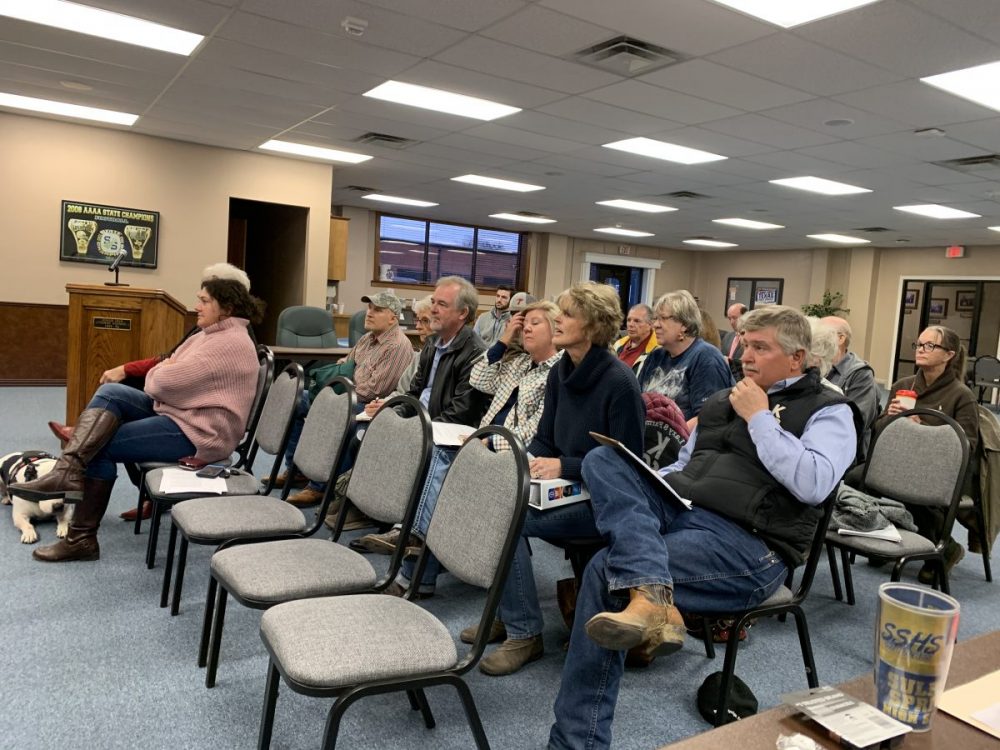
Approximately 3 dozen people attended Sulphur Springs Independent School District Board of Trustees’ special called meeting to voice their thoughts regarding proposed solar projects, Hopkins Energy LLC in Dike and Solemio Solar LLC south of town in the Arbala area.
During the Dec. 19 public hearings, many community members indicated concerns regarding the proposed projects, especially the Solemio project. Seven individuals spoke in opposition to having a solar farm in or near Sulphur Springs neighborhoods.
Shari Mohl, who lives across the road from a portion of the proposed Solemio solar farm, asked the SSISD board to consider several factors instead of giving approval to any additional solar projects.
She told the board she had compiled notebooks several inches thick filled with paperwork, communication between the school, contractors and others through March regarding the proposed Solemimo project. She said based on her understanding and research, she believes “what’s being presented” to SSISD are “pie in the sky and best case scenarios.”
“From some of the research we have done, there are a lot of holes in their numbers,” Mrs. Mohl said. “Other things that you really need to consider are our county, our community, our people that are here, our neighbors. This is not the place for these.”
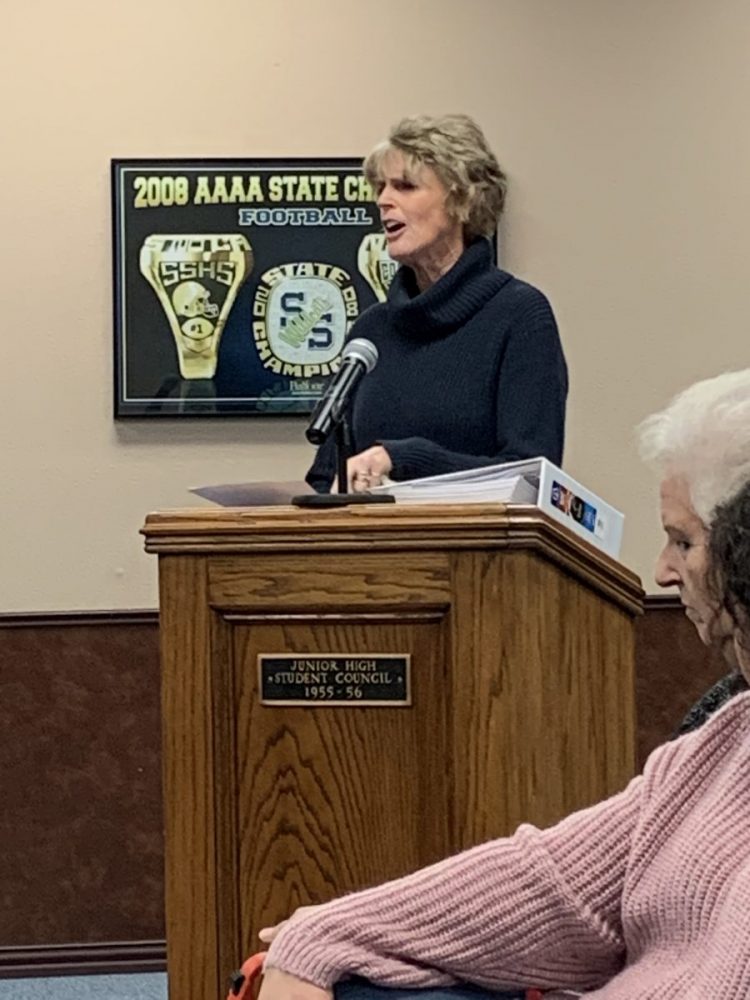
Both Shari Mohl and David Dunagan expressed concern that job requirements for Chapter 313 agreements were not being met.
David Dunagan said the original intent of Chapter 312 and 313 agreements, was to draw business and industry to Texas and create jobs. He contended the solar farms aren’t bringing in a lot of permanent jobs to contribute back into the local economy, and thereby increase the tax base.
The solar companies anticipate putting about 200 people to work on site during the construction of the farms, but only a few jobs after that. They’ve requested waivers so they won’t have to meet the jobs requirement stipulated in for 313 agreements, Dunagan pointed out.
“We want the waivers to go away because it does not help your county. It does not help any county in Texas if you have not generated any jobs. You’ve given your tax dollars away, but you have not generated the jobs to counteract that,” Dunagan said.
“We are not helping our community members by waiving that requirement for taxes,” Mrs. Mohl said.
Wayne Cooper, developer for Rock Creek subdivision, said he has friends who have businesses in town, and none of them to his knowledge asked for a tax abatement, but they do contribute to the area.
“It just doesn’t seem fair to local people. I know there’s advantages for having companies come in. The EDC offers property at a low price” Cooper said. “I’m for it: we’re putting people to work, local people to work in volumes, where it will benefit everyone concerned. But I feel for the local businessmen, they’re not here now. A lot of them are just not that kind of people to complain, but I feel for them.”
Cooper said he doesn’t see the long-term advantage of offering the tax advantages for the solar projects, which are limited to the life span of the solar panel.
“I just think that any viable business should be willing to pay taxes like the rest of us do. I pay taxes. It’s just the American way to pay taxes. In my business, the success of my business is being able to pay taxes. That’s part of the joys to be able to pay them, not that it’s my first choice to do with my money. But, you’ve succeeded when you can pay your taxes, you can earn profit,” Cooper said.
Shari Mohl expressed concern the nearness of a proposed solar plant to residences would negatively impact property values. Most solar plants are built far from housing, and a study, she said showed that those that are built closer homes negatively impact property values. She noted Rock Creek subdivision and other properties nearness to the planned farm.
“This is not the place for that, for these things for that reason,” Mrs. Mohl told the school trustees.
Carrie Nuckolls, a local realtor, said she and her husband put their house on the market 4-5 months; they had one interested potential buyer, who ultimately did not make an offer due to uncertainty regarding the proposed solar farm. She says it’s already affecting property sales.
“I have been called out to properties north of town and have listed homes because a solar farm was going in near them. They didn’t want to live by it,” Nuckolls said. “We will not be able to sell our properties for as much, residential properties, probably won’t be able to sell farm and ranch for as much in those area because of the threat of the environmental issues.”
“Your property taxes are your single greatest income producer that you have, the school district especially, far and above the city and the county. You receive the far greatest amount from all the property taxes. I think if you continue to vote to let these guys come in then you’re going to ultimately end up reducing one of the most profitable revenue streams that you have in one of the most profitable areas of town, right there south of town,” Nuckolls said.
Duangan said the projects may not be as productive energy-wise as projected. He said one of the two projects is projected to produce up to 320 megawatts. That is the maximum the project can produce on a sunny day with no clouds and perfectly clean panels, not the average or what it will typically produce, Dunagan contended.
The generation of electric energy through solar panels doesn’t necessarily mean electric costs will go down either, Dunagan said. He said Department of Energy studies show that between 2009 and 2017, energy costs in five states that use “green energy” increased 21-40 percent during that time.
“Do you know what the national average was at at that time? Seven percent. Texas went down in that time period. Why? Natural gas,” Dunagan said.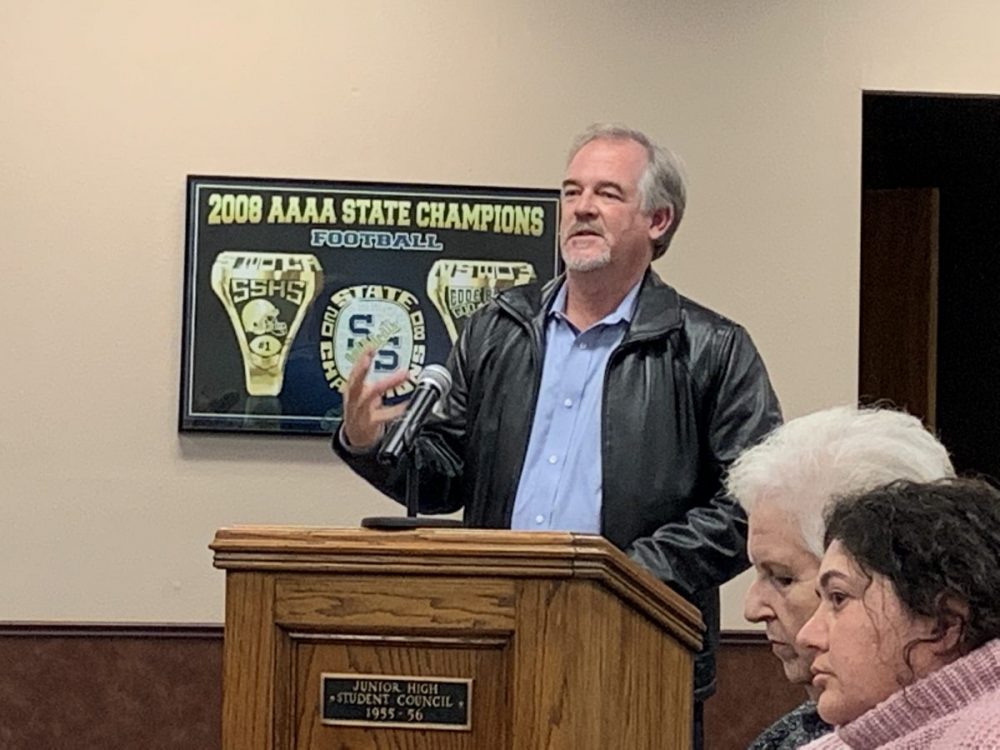
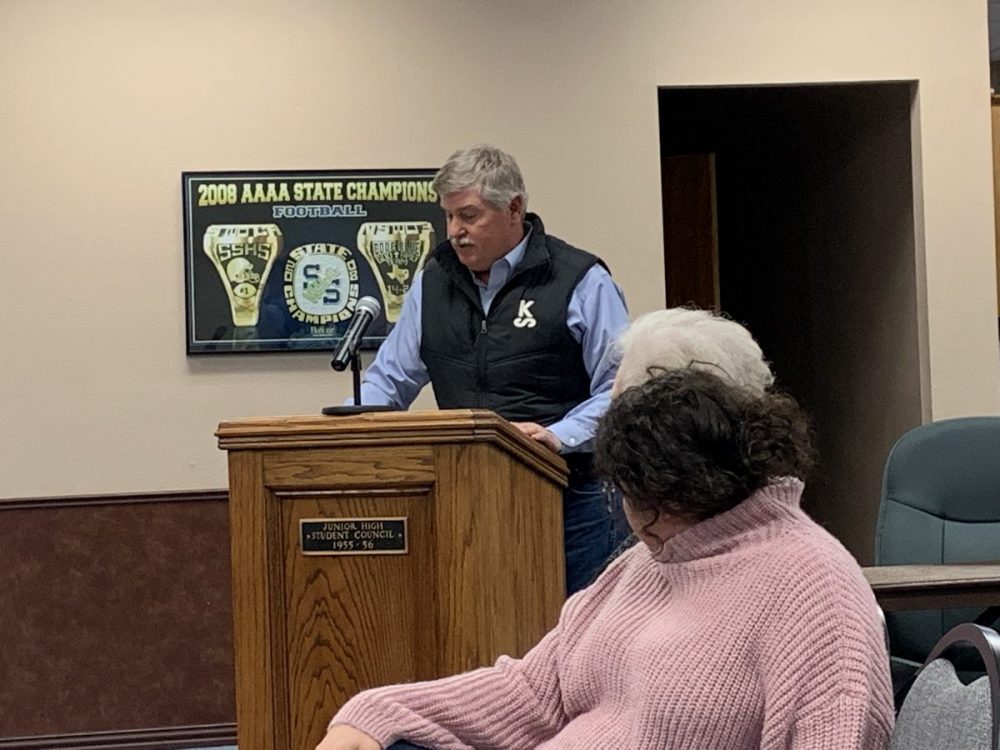
Dunagan also asked the board to consider the impact if one of the solar plants is destroyed or damaged by weather such as hail and tornado. He asked whether the limited liability company would repair their equipment or pull out before the 20-30 years of farm’s projected lifespan.
“Do they stay 20 to 30 years? If it makes it 20 or 30 years, do they have in there they’re going to pay to reclaim that land and put it back the way it was? If a tornado blows through, do they have money in place to repair? Are they going to say we’re out because we can’t make any money? You’re children and your children’s children have to pay for what they’re left with,” Dunagan.
Kevin Mohl said all of the information he’s seeing from documents related to the proposed project put it at $20 million to $25 million, but the district has been quoted estimated payments based on a $90 million value.
Mr. Mohl said he talked to one of the contractors who will be building the Solemio project. They discussed the cost of the project. Mr. Mohl said he was told it would cost $28 million to $30 million.
Kevin Mohl said when he asked someone who serves on a Greenville electric board what he thought of solar energy, he was told solar energy is “terrible.” There are losses with solar energy; the panels lose their value in 5-7 years, Mohl said he was told.
“These things that you guys are getting for your tax values, that you are seeing, I’m not hearing from these other people that you guys are going to get that money, because it’s based on taxable value. I hope that you’ll check to make sure that what I’m hearing is the same as you guys are hearing,” Mr. Mohl said.
Cooper asked if the tax abatement, the chapter 313 agreement, had already been made, or if it was still to be determined.
Superintendent Mike Lamb noted the agreement with Solemio has been previously approved. The amendment will simply adjust the figures to reflect the current tax rate, which went down due to legislative changes regarding school taxes. An amended reinvestment is required as well.
“We stood to gain close to $844,000. That’s lowered to $807,000 with the lower tax rate,” Lamb said.
Dennis Gilbertson said he was asked by a person with the solar panel project what kind of road they lived on. When told oil-based, the man reportedly noted that they usually put solar panels on property accessed by gravel roads. The project representative also reportedly questioned the number of homes and trees within the vicinity of the proposed farm; he further said most of the time the solar panels are installed away from houses and trees, according to Gilbertson.
“I’d just like to say, why are you guys putting them in here? I don’t understand it a bit. I had a good view, now I’m going to see solar panels,” Gilbertson told the board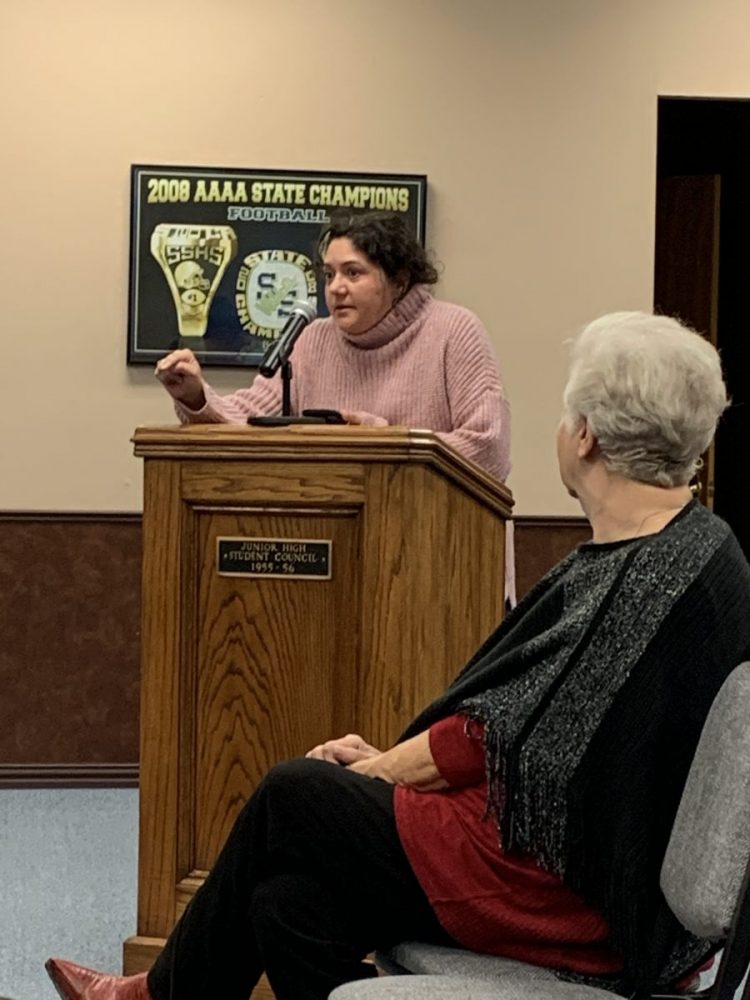
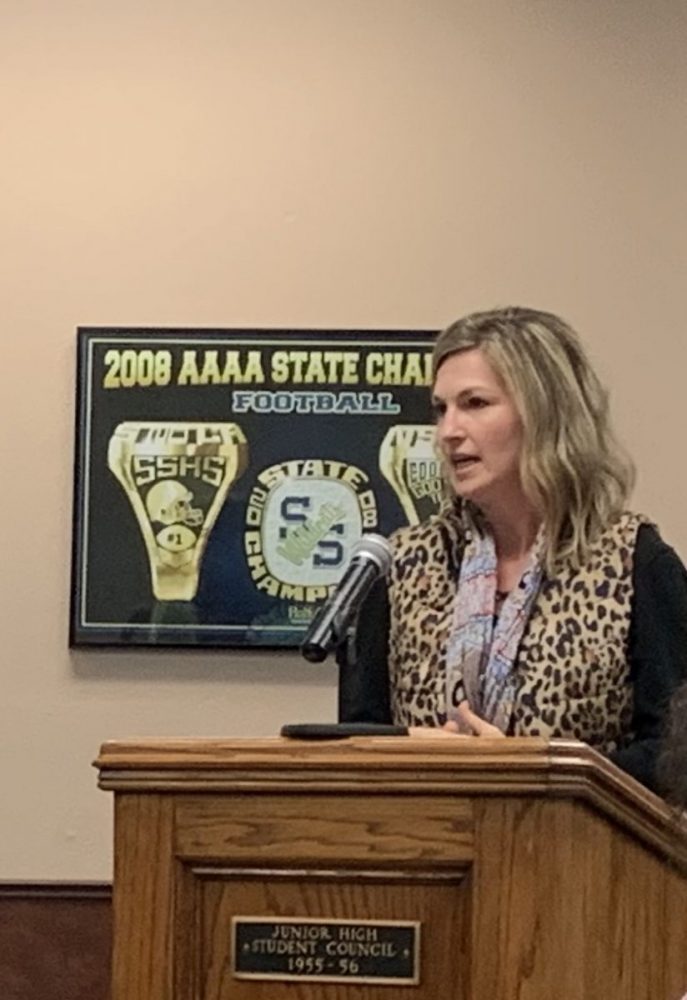
Selina Hood made it clear she is “not happy with this whatsoever.” Hood expressed concern for the health and environmental impact of a solar plant, especially on children, pregnant mothers and future generations.
“This needs to be researched more. It needs to be more considered. This should not be happening,” Hood said.
Hood expressed concern that potential tornado or hail damage to solar panels would allow chemicals from the panels to seep into the ground and water supply, which could result in serious health problems and environmental repercussions.
“Do you know what would happen if a tornado actually ransacked as solar panel farm? Do you know what happens? Nobody could live on it, whatsoever, because those panels are chemicals. Everything that has to do with those panels is not good,” Hood said.
Hood said, in all of her travels as a truck driver and previous work with OSHA through the military, she’s never seen a solar farm so close to a residential subdivision and agricultural area.
She expressed concern for the heat of the panels, how it would impact everything near it.
“I’ve seen it first hand, I’m a witness to what those things do. I’ve seen houses catch on fire. I have seen birds poof,” she said using her hand to indicate a bird combusting. “It’s sickening. It has wiped out acres and acres of grassland.”
“You can do what you want. I know you want money. I understand that, your tax dollars. The thing of it is your heart, your moral purpose, the children, the community,” Hood said.
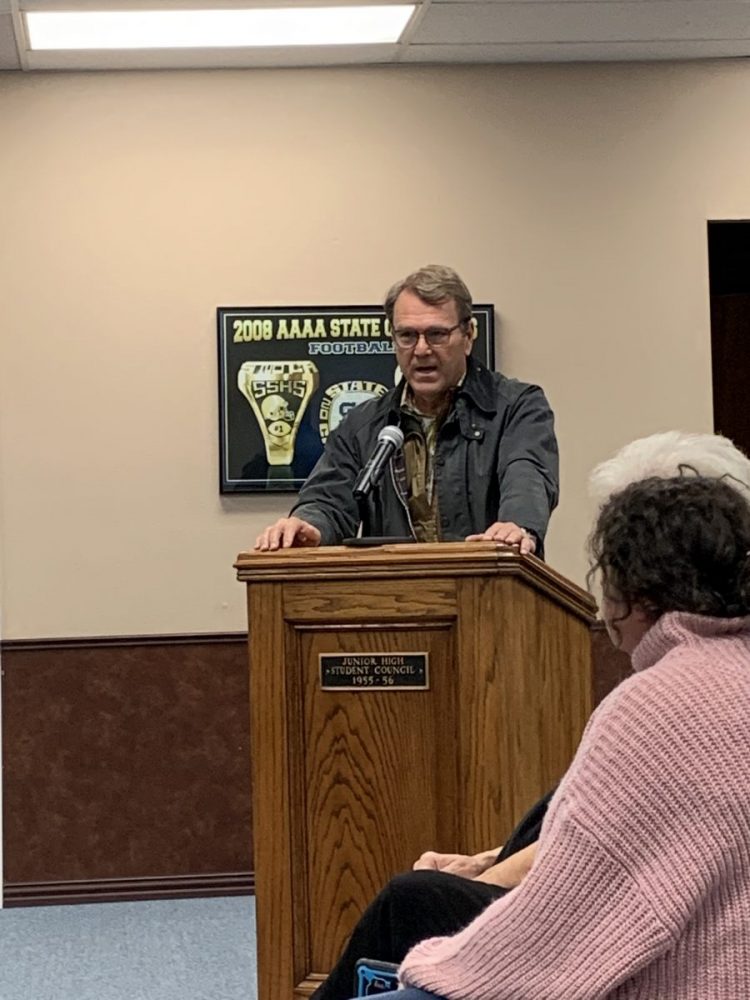
Wayne Cooper spoke during the SSISD Dec. 19 meeting
Hood asked if the school district had done any research into the potential projects and solar farms.
“We absolutely did a lot of research,” Lamb replied.
Lamb pointed out that it was not a back and forth question and answer session, but a time for public comments.
After the comment period was over, he recommended the board go into executive session to discuss what they’d heard, then return to “see where we’re at.”
After the session, the each school board members reported not conflicts of interest to either of the proposed projects, then tabled all further action related to the solar projects until another time.
Lamb community members he’d like to visit with them in the future and take into consideration their points.







